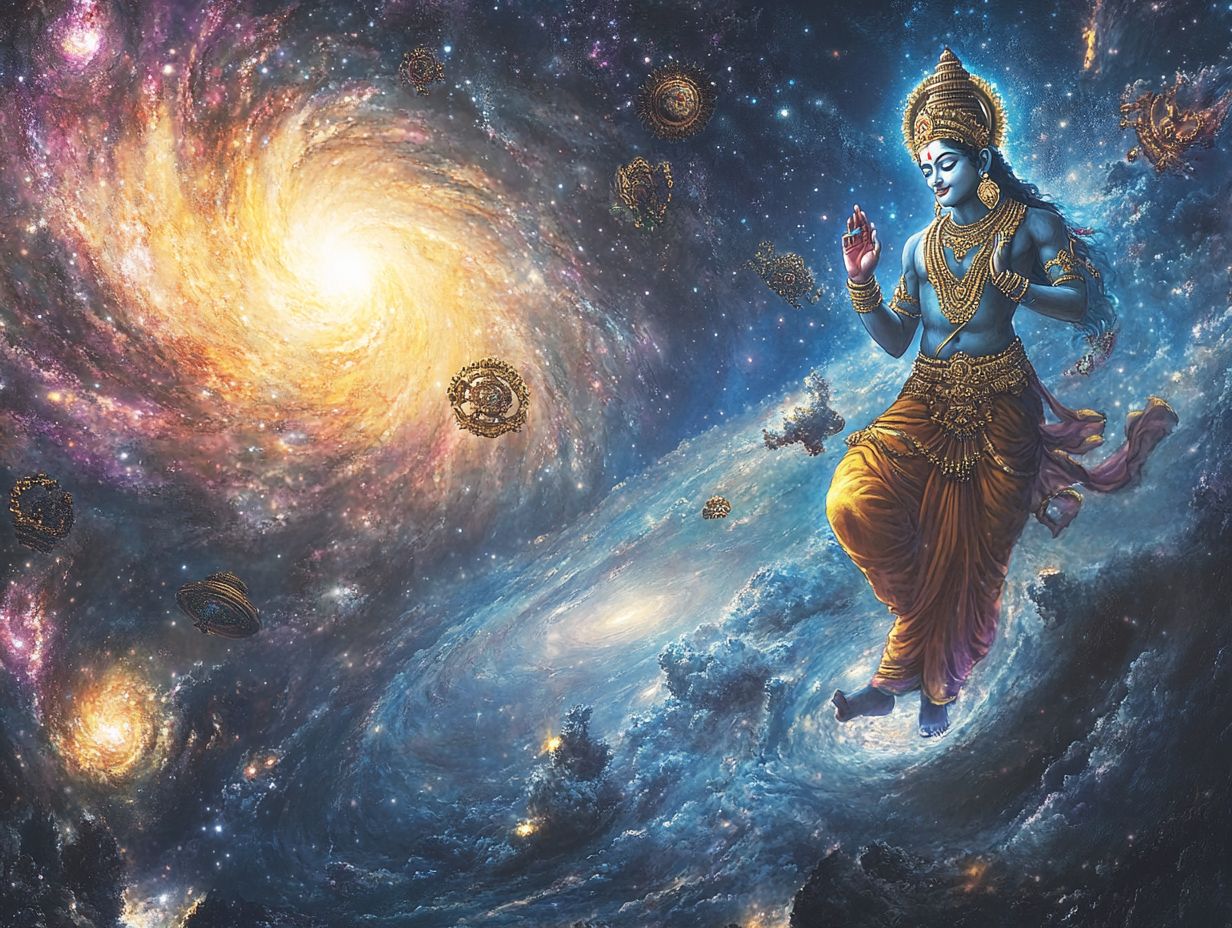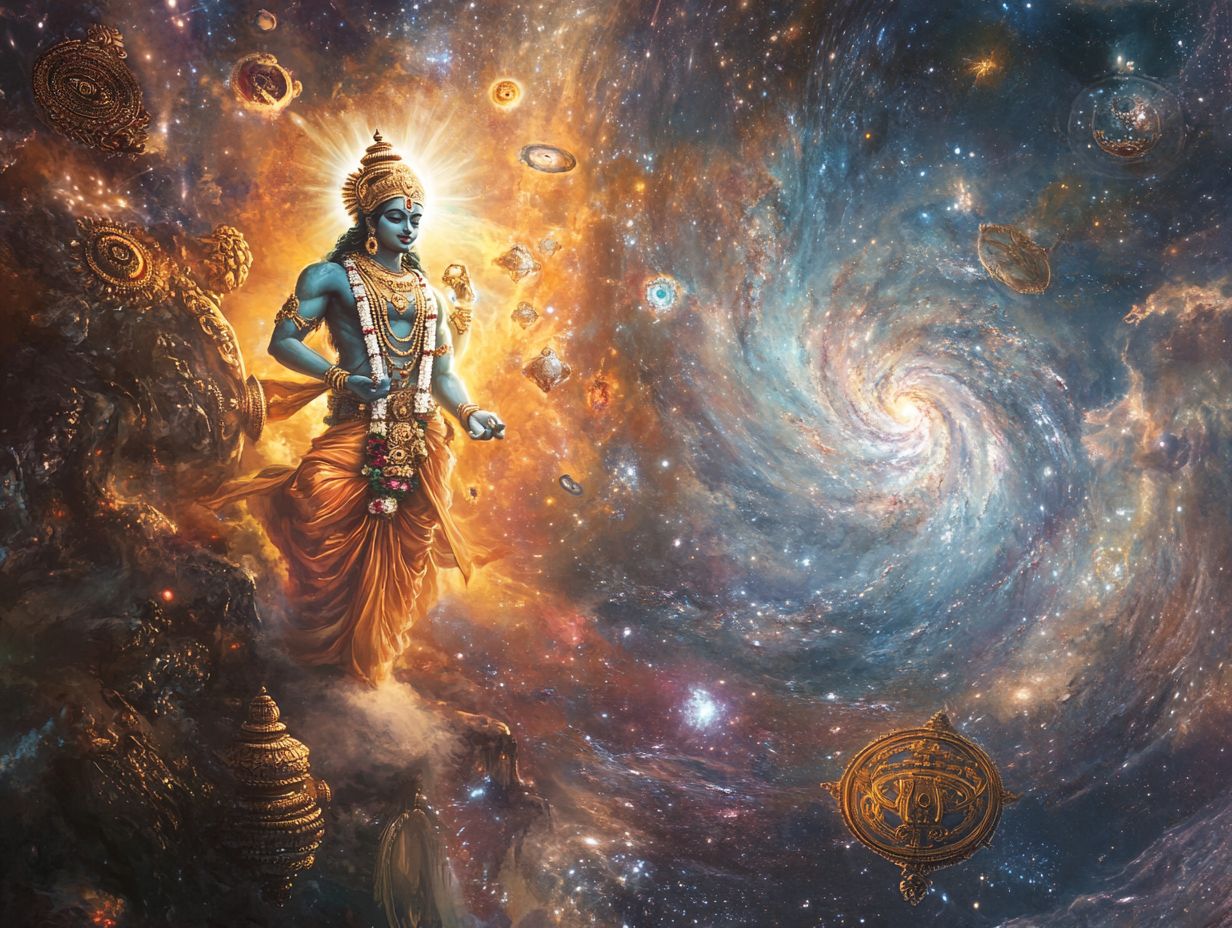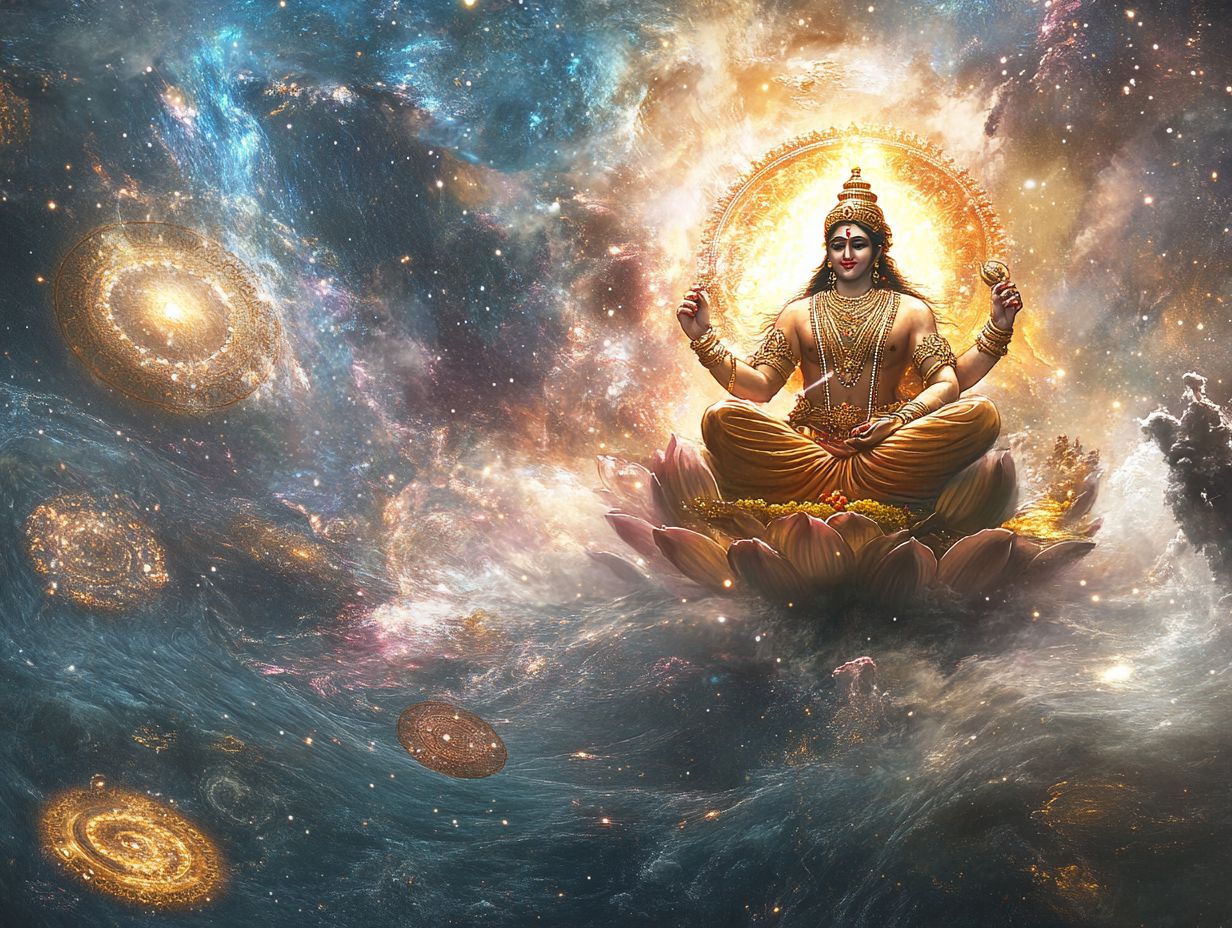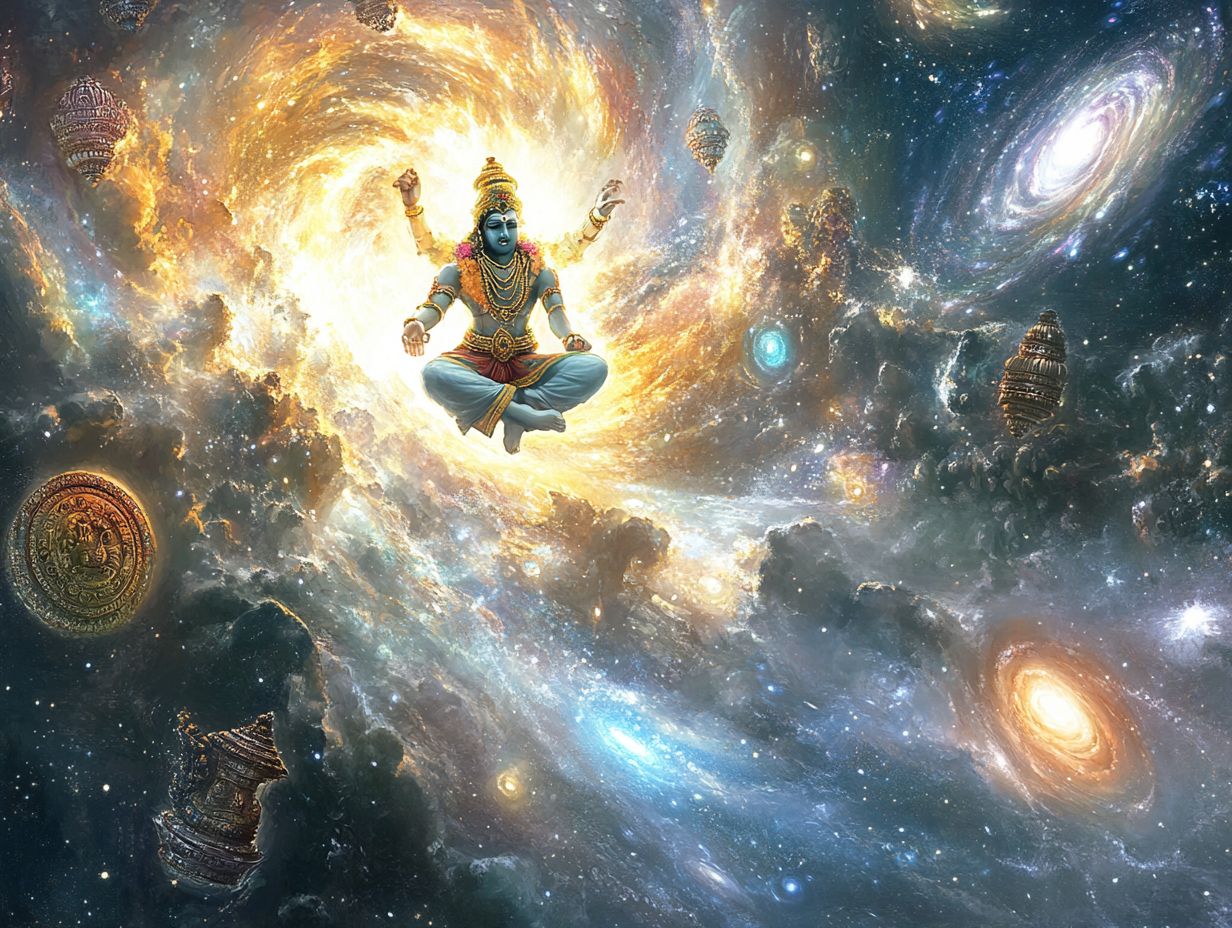What Does Hinduism Say About the Universe?
Hinduism presents a rich tapestry of beliefs that intricately shape its understanding of the universe, diving into themes of creation, purpose, and the inevitable cycles that govern existence. These beliefs are deeply rooted in ancient texts such as the Vedas and the Upanishads.
This exploration of Hindu cosmology reveals the complex components that constitute the universe and the divine forces that orchestrate its creation.
Within this framework, one can uncover the significance of karma in human existence, the roles individuals play within these cosmic cycles, and the beliefs pertaining to the universe’s ultimate conclusion. The concept of Maya highlights the illusionary nature of the material world, emphasizing the need for spiritual practices and rituals to achieve liberation.
The insights offered by Hinduism illuminate humanity’s place in this vast and dynamic cosmos, inviting deeper reflection on the interconnectedness of all things. This worldview encourages meditation and ethical living to align with the cosmic order.
What are the Core Beliefs of Hinduism?

Hinduism, recognized as one of the world s oldest religions, presents a complex tapestry of beliefs and practices intricately woven around foundational concepts such as Dharma, karma, and the cycle of samsara. These principles profoundly influence the lives of millions, offering guidance through sacred texts like the Bhagavad Gita and the Upanishads.
At the heart of Hindu philosophy lies the concept of Atman, the eternal soul, seamlessly integrated into the very fabric of existence and reality. This notion serves as a guiding force for individuals on their journey toward enlightenment and liberation (moksha).
The teachings of Hinduism encompass both dualism and non-duality, offering a multitude of spiritual paths for seekers. Each of these paths enriches the understanding of the universe and one’s unique place within it, guiding individuals towards enlightenment and moksha.
Hindu Cosmology
Hindu cosmology provides a profound insight into the universe, marked by intricate cosmic cycles and a divine order that embodies the interplay of energy and consciousness. Within this expansive framework, deities such as Brahma, Vishnu, and Shiva assume pivotal roles in sustaining cosmic balance and manifesting creation myths, thereby illustrating the intricate relationship between the material and spiritual realms. This cosmology is elaborated in texts like the Puranas and the Vedas, depicting the evolution of the universe through various yugas.
The notion of the cosmic egg (Brahmanda) further accentuates the cyclical essence of existence, where creation, preservation, and dissolution engage in an eternal dance of divine play (Lila), guided by the principles of Sanatana Dharma and cosmic consciousness.
What is the Hindu Concept of the Universe?
The Hindu concept of the universe transcends a singular existence, embracing the notion of a multiverse that reflects divine consciousness and the cosmic intelligence that governs reality. This holistic perspective acknowledges the interconnectedness of all beings, emphasizing the material world as a manifestation of the eternal spiritual essence inherent in Brahman, the ultimate reality. The cyclical concept of time and yugas plays a central role in understanding the cosmic dance of creation and dissolution.
In this intricate cosmic tapestry, time and space are perceived as fluid dimensions, where existence unfolds as a continuous cycle of creation and dissolution, guided by the principles of Dharma and karma.
Within this framework, the interplay between the material and spiritual realms creates a dynamic landscape where every action reverberates throughout the cosmic fabric. Individuals are regarded as integral components of this vast mosaic, navigating journeys shaped by both personal choices and universal laws.
The Hindu worldview further posits that wisdom emerges from recognizing the transient nature of physical existence, prompting seekers to transcend lower consciousness and align with the higher cosmic order. This understanding invites individuals to engage in a reality where enlightenment is attainable through self-awareness and spiritual practices, ultimately bridging the divide between the seen and the unseen. Practices such as meditation, prayer, and studying sacred texts like the Bhagavad Gita are essential for spiritual evolution.
What are the Components of the Universe according to Hinduism?
According to Hinduism, the universe is intricately woven from five fundamental elements earth, water, fire, air, and space each of which contributes to the cosmic order and sacred geometry that underlies all existence. These elements are not merely physical substances; they carry profound spiritual significance, reflecting the delicate balance that exists between the material and spiritual realms. The Vedic texts illuminate the interactions among these elements within the framework of Dharma, shaping the cycles of creation and dissolution that define the universe. The Puranas also elaborate on the roles of celestial bodies like stars and planets, integrating astrology into this comprehensive cosmology.
Each element plays a pivotal role in shaping both the external environment and the inner landscape of the self. Earth symbolizes stability and grounding, while water embodies fluidity and emotional depth. Fire is linked to transformation and energy, air represents life and breath, and space encompasses potential and infinity.
These elements are deeply intertwined with sacred geometry, where geometric patterns resonate with the underlying order of the cosmos, symbolizing the harmony between the microcosm and the macrocosm. Understanding these intricate relationships offers profound insights into the holistic nature of existence, guiding practitioners on their spiritual journeys. The practice of meditation and rituals, often centered around sacred geometry, aids in aligning with the cosmic order.
The Creation of the Universe
The creation of the universe in Hinduism unfolds as a richly layered narrative, teeming with symbolism and divine interactions that illuminate the roles of formidable Hindu deities in this cosmic spectacle.
At the heart of this creation story lies the concept of the cosmic egg, or Brahmanda, from which the universe arises, echoing the primordial sound of Om an embodiment of the essence of existence.
This mythology reflects a deep-seated belief in a divine consciousness that not only triggers the act of creation but also nurtures it throughout the cycles of time and the maintenance of cosmic equilibrium. The sacred sound of Om encapsulates this essence, representing the vibrational frequency of the universe.
What is the Hindu Creation Story?
The Hindu creation story unfolds as a divine narrative in which Brahma emerges from the cosmic waters, initiating the process of creation under the guidance of Vishnu, the preserver, and Shiva, the destroyer. This cosmic dance of creation, preservation, and dissolution encapsulates the principles of dualism and non-duality, illustrating the profound interconnectedness among these deities in shaping the universe. The trimurti of Brahma, Vishnu, and Shiva symbolizes the unity and diversity inherent within the cosmos.
Through their divine play, or Lila, the material world comes into being, reflecting the eternal cycles of existence and the pursuit of enlightenment.
From the primordial chaos, Brahma meticulously crafts the world with his four faces, each symbolizing one of the four Vedas, infusing creation with both life and purpose. Meanwhile, Vishnu introduces balance and harmony, ensuring that the flourishing of creation is sustained, while Shiva provides the crucial transformative force of destruction, serving as a poignant reminder of life s inherent impermanence.
This intricate interplay accentuates not only the distinct roles of each deity but also their unity, where creation and destruction are not opposing forces; rather, they are essential components of a singular cosmic process. Thus, the narrative invites seekers to recognize their own place within this divine cycle, encouraging them to move toward enlightenment as they navigate their journeys through existence.
What Role do Gods and Goddesses Play in the Creation of the Universe?

In Hindu cosmology, gods and goddesses assume pivotal roles in the universe’s creation, embodying the principles of divine consciousness and the cosmic order that underpin existence. Shakti, representing the divine feminine energy, complements the masculine deities such as Brahma, Vishnu, and Shiva, illustrating the essential balance of forces required for creation. This dynamic interplay not only highlights the multifaceted nature of the divine but also underscores the unity and diversity inherent within the cosmos. This balance is central to the Hindu philosophical systems of metaphysics, which explore the relationships between the material and spiritual realms.
Each deity symbolizes distinct qualities and responsibilities that weave together the intricate tapestry of creation. For instance, Brahma, the creator, is associated with knowledge and intellect, shaping the physical reality of the world. In contrast, Vishnu, the preserver, embodies compassion and mercy, ensuring balance and harmony throughout the universe. Shiva, recognized as the destroyer, signifies transformation and regeneration, emphasizing the cyclical essence of life. The interplay of these deities is a testament to the divine intelligence that governs the cosmos.
Together, these divine figures exemplify the interconnectedness of all things, reinforcing the fundamental essence of unity amid diversity. This cosmic interplay serves as a poignant reminder that maintaining balance is essential not only in the vast universe but also in the individual lives of all beings.
The Purpose of the Universe
In Hinduism, the purpose of the universe is intricately linked to the principles of Dharma and karma, forming a comprehensive framework for comprehending existence and fostering spiritual growth. This perspective is elaborated in sacred texts like the Bhagavad Gita and the Upanishads, offering profound insights into the nature of reality and the cosmic order.
This profound perspective highlights the significance of ethical living and dedicated spiritual practices, such as prayer and meditation techniques, directing individuals on their journey toward enlightenment and liberation, known as moksha.
By acknowledging one’s duty within the cosmic order, individuals cultivate a sense of unity and purpose, illustrating how each person plays a vital role in the greater tapestry of life. This perspective encourages adherence to natural law and the pursuit of universal truths.
What is the Hindu Belief about the Purpose of the Universe?
Hindu philosophy regarding the purpose of the universe encompasses the belief that all existence is a manifestation of divine consciousness, reflecting a cosmic order and divine creation that meticulously guides (Sanatana Dharma) the unfolding of life. This perspective fosters a profound understanding of individual roles within the grand tapestry of reality, where each action harmonizes with the principles of Dharma and Maya and karma, ultimately culminating in spiritual growth and connection to the divine (Brahman) and enlightenment.
Such beliefs underscore the interconnectedness of all beings in the cosmos, emphasizing the necessity of making positive contributions to the universe (cosmos) to the universe.
By acknowledging one’s position in this intricate web, individuals are inspired to act with heightened awareness and intention, cultivating a profound sense of responsibility toward both themselves and others. This sense of duty and moral order not only shapes personal choices but also enriches relationships within the community and interconnectedness, reinforcing the notion that every thought and action resonates throughout the very fabric of existence.
The journey toward realizing one’s true potential is perceived as a path of self-discovery and service and moral dilemmas and ethical questions, where fulfilling one s unique role contributes to the overall harmony and balance of the cosmos.
How does Karma Play a Role in the Purpose of the Universe?
Karma plays a pivotal role in the cosmic consciousness in the universe’s design, establishing a sophisticated framework of cause and effect, as described in the Vedas that influences the life cycles of all beings. Through the actions taken during one s lifetime, individuals navigate the intricate concepts of reincarnation and spiritual progression, which is a key concept in Hinduism, intricately shaping their journey toward enlightenment.
This complex web of karma reinforces the belief that every action carries significant weight in the cosmic balance and universal truth and cosmic orders, guiding souls through the cycles of existence.
The understanding of karma not only illuminates the importance of personal responsibility but also nurtures a deeper connection to the universe. By recognizing that every deed, whether positive or negative, reverberates across lifetimes, individuals can harness this awareness to cultivate compassion and personal growth.
This profound comprehension of karma encourages self-reflection, prompting an exploration of how one s choices impact not only their own journey but also the collective experience of humanity. Embracing this knowledge can inspire transformative changes, enabling souls to evolve and liberate themselves from the repetitive patterns that may bind them within the cycle of reincarnation, as mentioned in the Upanishads.
The Cycles of the Universe
The cycles of the universe in Hinduism serve as a profound representation of cosmic order, encapsulating the rhythmic nature of time as it ebbs and flows through the various Yugas, or ages, as detailed in ancient texts. These cycles illustrate the cosmic dance of creation, preservation, and dissolution, highlighting the continual evolution of existence, as described in the Puranas.
Each Yuga embodies a distinct stage in spiritual and material development, embracing both dualism and non-dualism, underscoring the belief that the universe is a dynamic interplay of energies and consciousness, including cosmic energy.
What are the Different Cycles of the Universe in Hinduism?
In Hinduism, the universe is cyclically segmented into four distinct Yugas Satya, Treta, Dvapara, and Kali each representing unique phases of spiritual ascendance and dual nature and decline. These cosmic cycles and time cycles elucidate the perpetual dance of virtue and ethical integrity and vice, illustrating how the essence of human existence and consciousness evolves over time. A deeper understanding of these Yugas offers profound insights into the continuous journey of souls as they maneuver through the intricate tapestry of existence.
Each Yuga embodies specific characteristics that significantly influence human values and societal frameworks. The Satya Yuga, often lauded as the Golden Age, a period of divine creation, is characterized by truth, righteousness and natural law, and an intimate connection to the divine. As the cycle transitions into the Treta Yuga, a slight waning of faith introduces themes of duty and morally ambiguous dilemmas and existential questions. Progressing further into the Dvapara Yuga, the equilibrium between good and divine play and evil and duality begins to falter, resulting in heightened conflicts and a noticeable decline in purity. Finally, the Kali Yuga, known as the age of darkness, reflecting the material world, marks a period of profound ethical degradation and spiritual disconnection and spiritual disconnection.
This cosmic rhythm serves as a vital lens for practitioners, illuminating their spiritual journey and enlightenment paths and underscoring the importance of self-awareness and moral integrity and sacred order as they navigate the myriad challenges of life.
How do these Cycles Affect the Universe and its Inhabitants?

The cosmic cycles exert a profound influence on the universe and its inhabitants, shaping the spiritual landscape and cosmic consciousness and karmic dynamics and universal consciousness present in each Yuga. As the universe progresses through these cycles, the opportunities for spiritual development and growth shift, molding the experiences of individuals and communities alike. This cyclical essence underscores the interconnectedness of all beings and highlights the necessity of aligning one s actions with the grand cosmic order and ultimate reality and liberation.
The transitions between the Yugas introduce distinct energies and influences that guide individuals along their personal journeys. During these intervals, the lessons derived from past actions come to fruition, allowing the manifestation of karmic consequences and transcendence that may either elevate one s spiritual path or present formidable challenges to navigate.
Individuals who are attuned to these universal rhythms often develop a heightened mindfulness regarding their choices, understanding that every action reverberates throughout the cosmos. By embracing the teachings imparted during each cycle, inhabitants can cultivate greater awareness and nurture deeper connections, thereby contributing to a harmonious existence and balance in alignment with the universal flow.
The Role of Humans in the Universe
In Hinduism, the significance of human beings within the universe is deemed paramount, with each individual recognized as a crucial contributor to the cosmic order and the intricate tapestry of existence.
Human actions, informed by the principles of Dharma and karma, not only craft personal destinies and life purpose and evolution of the universe but also reverberate throughout the broader spiritual journey of the universe. This perspective underscores the profound responsibility that each person bears within the interconnected web of life, nurturing a sense of unity and fostering understanding across a myriad of diverse experiences.
What is the Hindu Belief about the Role of Humans in the Universe?
The Hindu belief regarding the role of humans in the universe asserts that each individual bears a cosmic responsibility that is intricately woven into the greater spiritual journey of existence. This viewpoint underscores the notion that every action and thought not only contributes to the individual’s karma but also influences the entire cosmos.
In this framework, the pursuit of Dharma representing one s moral duties and ethical conduct guides individuals in navigating their responsibilities, striking a balance between personal aspirations and the needs of the broader community. The recognition of interconnectedness prompts individuals to appreciate the significance of their roles, where even the smallest acts of kindness and compassion resonate throughout the very fabric of existence.
Ultimately, this profound understanding fosters a purposeful approach to life, encouraging individuals to cultivate virtues that elevate both themselves and those around them in their shared quest for spiritual enlightenment and liberation.
How do Humans Contribute to the Cycles of the Universe?
Humans intricately contribute to the cycles of the universe through their actions and intentions, generating karmic influences that ripple through the fabric of existence. By engaging in positive actions and spiritual practices and adhering to the principles of Dharma, individuals actively shape the spiritual evolution and enlightenment paths of both themselves and the universe. This dynamic interaction underscores the significance of conscious living in harmony with cosmic laws.
Every thought, decision, and action becomes a thread woven into the intricate tapestry of reality, influencing not only personal destinies but also the collective consciousness and universal truths. As individuals navigate their lives with awareness and intention, they harness the power of karma, with the capacity to either elevate or diminish their vibrational frequency. Choosing compassion, mindfulness, and empathy allows them to initiate transformative shifts that resonate throughout the cosmos.
This conscious approach to existence fosters a profound understanding of interconnectedness, where each individual s journey weaves into the grand narrative of being, ultimately guiding spiritual awakening and ultimate reality and collective growth.
The End of the Universe
In Hindu cosmology, the conclusion of the universe in Hindu cosmology is perceived within the context of Hindu cosmology not as an ultimate end, but rather as an essential cosmic dissolution and sacred geometry that sets the stage for rebirth and renewal, as part of cyclical time and renewal. This cyclical nature of creation and destruction is fundamental to existence, embodying the perpetual process of creation and destruction through which the universe undergoes transformation and regeneration and regeneration.
Within this framework, the ultimate aspiration for individuals is moksha moksha provides liberation from the cycles of samsara, facilitating a profound disconnection of the soul from the material realm and transcendence.
What is the Hindu Belief about the End of the Universe?
Hindu belief regarding the end of the universe is intricately framed within the context of cosmic cycles, where destruction serves as a precursor to rebirth and renewal. This cyclical perspective accentuates the transient nature of existence, portraying the universe as continuously evolving through phases of creation and dissolution. The concepts of yugas and time cycles highlight this continuous evolution. Thus, each ending presents an opportunity for transformation, embodying the eternal interplay of forces that shape reality.
This understanding fosters a distinctive attitude towards life and death, encouraging adherents to embrace change rather than succumb to fear. Within this framework, death transcends mere finality; it symbolizes a transition to another existence. Souls, guided by the laws of karma and dharma, are believed to be reborn in various forms, a conviction that nurtures compassion and a sense of interconnectedness among all living beings.
By acknowledging the impermanence of life and the inevitability of rebirth, individuals are inspired to live with intention, cultivating their spiritual evolution and grasping the profound significance of their actions in each lifetime. This understanding is deeply rooted in Hindu philosophy and sacred texts like the Bhagavad Gita and Upanishads.
What Happens to Humans and the Universe after it Ends?

After the conclusion of the universe, the fate of humanity becomes intricately entwined with the principles of reincarnation and liberation (moksha), as the journey of the soul persists beyond the confines of the physical realm. As the universe undergoes its cyclical transformations, individuals may find themselves reborn into new experiences, facilitating further spiritual evolution. These beliefs are encapsulated in Hindu cosmology and metaphysics, as detailed in ancient texts like the Puranas and Vedas.
Conversely, those who achieve moksha liberate themselves from the cycles of existence, ultimately attaining union with the ultimate reality. This state of liberation is often described as an experience of non-dualism where the soul realizes its oneness with Brahman.
This cyclical nature of existence implies that the end of one epoch merely signals the dawn of another, allowing souls to traverse a myriad of forms until they attain a state of spiritual maturity. The profound implications of this belief resonate deeply as individuals reflect on their roles within this grand tapestry of cosmic cycles. The Sanatana Dharma or eternal order emphasizes this continuous journey towards enlightenment and eventual moksha.
By actively engaging with the principles of karma and dharma throughout their lifetimes, they can shape their future incarnations, striving towards ultimate liberation. For many, the pursuit of moksha transcends being a mere end goal; it embodies a holistic understanding of their interconnectedness to the universe, underscoring a journey marked by continuous growth and transformation. This path of spiritual evolution is often guided by practices such as meditation, rituals, and the study of sacred texts like the Vedas and Upanishads.
Frequently Asked Questions
What does Hinduism say about the universe?
Hinduism views the universe as an eternal cycle of creation, preservation, and dissolution. It is believed that the universe has no beginning or end, but goes through cycles of creation and destruction, with no ultimate beginning or ultimate end. This perspective is central to Hindu cosmology and the study of cosmic order.
How does Hinduism explain the creation of the universe?
Hinduism explains the creation of the universe through the concept of Brahman, the ultimate reality and source of all creation. It is believed that Brahman creates the universe through the power of Maya, or illusion. This creation process is a central theme in many creation myths found in Hindu sacred texts.
What is the role of the gods in Hinduism’s view of the universe?
Hinduism sees the gods as manifestations of the ultimate reality, Brahman. They are not seen as separate entities, but rather different aspects of the same divine essence. The gods, including Vishnu, Shiva, and Shakti, are responsible for the maintenance and preservation of the universe.
Does Hinduism believe in a multiverse?
Some interpretations of Hinduism do include the concept of a multiverse, with the belief that there are multiple universes existing simultaneously. These universes, or cosmos, are seen as part of the larger cosmic cycle of creation and destruction.
What is the purpose of the universe according to Hinduism?
Hinduism sees the purpose of the universe as part of the larger cosmic cycle, with the ultimate goal being moksha, or liberation from the cycle of birth and death. It is believed that the universe provides opportunities for souls to progress towards this ultimate goal. The concepts of spiritual practices, dualism and non-dualism play a significant role in this journey.
How does Hinduism view the relationship between humans and the universe?
Hinduism teaches that humans are a microcosm of the universe and are connected to it in a complex web of relationships. Humans are seen as responsible for maintaining balance and harmony in the universe through their actions and intentions. This interconnectedness is often emphasized in Hindu spiritual practices and meditation techniques.
